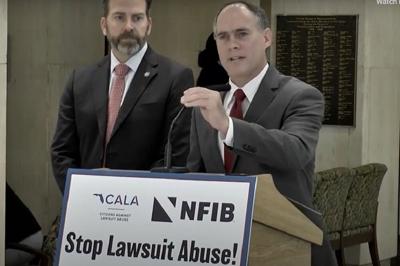
Florida CALA Executive Director Tom Gaitens
The Florida House of Representatives this week received the dubious moniker of “Lawsuit Inferno” for its efforts during the 2025 legislative session to roll back tort-reform measures that were improving the state’s legal climate.
The American Tort Reform Association made the announcement on July 29 as part of an annual assessment of which states are making strides in advancing tort reforms to curb excessive civil litigation and which ones appear less committed to doing so. Florida’s lower house received the “Lawsuit Inferno” distinction along with five other states or state panels – New York, Colorado, Virginia, Illinois and West Virginia’s Senate Judiciary Committee.
After passing multiple legal or insurance reforms in 2023 and earlier years, Florida lawmakers advanced new bills this year in a bid to repeal some of the previous reforms. These included a House measure to expand who is eligible to file lawsuits seeking noneconomic damages, including pain and suffering, in wrongful death cases that allege medical negligence. That bill was ultimately vetoed by Gov. Ron DeSantis.
Another measure would have repealed a previous reform allowing juries to review the actual cost of a plaintiff’s medical care, as opposed to the higher “sticker price” on medical bills. The state Senate, however, rejected the proposal.
And another bill, which died in the Senate, would have replaced Florida’s no-fault auto insurance system with what the ATRA said was a lawsuit-driven, fault-based process.
Tom Gaitens, executive director of Florida Citizens Against Lawsuit Abuse, said the ATRA’s findings reflect a disappointing legislative year for tort-reform supporters in Florida.
“The Florida House, in particular, not only failed to continue to build upon the landmark successes, they carried the water for the billboard-attorney lobby and offered several sets of bills directly aimed at rolling back the civil justice reform successes,” Gaitens told the Florida Record in an email.
He said Florida can expect another round of such bills during the 2026 session in a bid to weaken the state of the civil justice system.
“It also marks an inflection point as the trial lobby is gaining significant influence inside the party which had finally brought needed reforms to our civil justice system,” Gaitens said. “Thankfully, Gov. DeSantis and (Republican) Senate President (Ben) Albritton had stood strong, but what looms in 2026 is deeply concerning.”
The ATRA reported that Florida residents are already paying a “tort tax” amounting to $1,238 per person per year, or nearly $5,000 for a family of four.
“Undoing these protections would invite a surge of lawsuits, threaten access to care and undermine the very progress that moved Florida forward,” Tiger Joyce, the ATRA president, said in a prepared statement. “We encourage the House to heed these warnings and rein in these attempts to expand liability in the future.”
The ATRA defines a “Lawsuit Inferno” as entities that failed to pass any meaningful tort reforms during their most recent legislative sessions, putting the civil justice system in danger of being mired in lawsuits.
In the case of Florida, previously passed legal reforms led to 11 new companies entering the state’s insurance market and auto insurance rates declining 6% to 10.5%, according to the ATRA.




